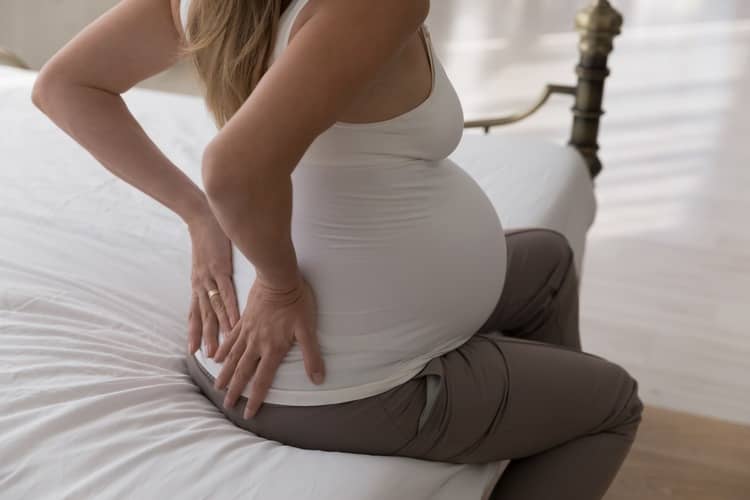
Hardening of abdomen in pregnancy. When is it dangerous? What does hardening of the abdomen before childbirth mean?
The mother's body goes through many changes during pregnancy. The course of pregnancy varies from case to case, and every first-time mother or expectant mother experiences it differently. One of the accompanying phenomena is the hardening of the abdomen during pregnancy. There is no need to worry about this phenomenon, the hardening of the abdomen during pregnancy is often completely natural. Considering the number of possible causes of abdominal hardening during pregnancy, in our article we will introduce you to the most common reasons for this phenomenon and explain why it happens. What does the hardening of the abdomen in pregnancy mean? When is the hardening of the abdomen in pregnancy dangerous? How to recognize the hardening of the abdomen?
- What does hardening of the abdomen in pregnancy mean - symptoms
- Hardening of the abdomen in the first trimester - the first manifestations and the growth of the uterus
- When is the hardening of the abdomen dangerous - the risk of miscarriage
- Hardening of the abdomen in the second trimester - physical exertion
- Abdominal hardening in the third trimester - messengers and labor contractions
- Braxton-Hicks contractions vs labor contractions
- Frequent hardening of the abdomen during pregnancy
- Abdominal induration and infection
- What helps to harden the belly during pregnancy and how to stop it?
- Experiences
- The most frequent questions - FAQ
- Comments
Hardening of the abdomen is a frequent and natural symptom of pregnancy. Gynecologists and experts in this field also agree on this. It is often referred to as a problem, because this feeling can be very frightening, especially for first-time mothers. It is important to know how to recognize the hardening of the abdomen in pregnancy. What causes the abdomen to harden and what the causes are depends on the stage of pregnancy (trimester) and the overall course. In any case, if you, as an expectant mother, are worried or observe certain abnormal manifestations, the best thing to do is to visit your attending physician, who will rule out any possible risks. Never underestimate the hardening of the entire abdomen during pregnancy. What does the hardening of the abdomen look like in pregnancy and what does it mean?
What does hardening of the abdomen in pregnancy mean - symptoms
A taut belly during pregnancy is not unusual. In general, the hardening of the abdomen during pregnancy can be characterized from the point of view of a pregnant woman as a certain feeling of discomfort in the abdomen and lower abdomen. Such hardening of the abdomen is painless or accompanied by only minimal pain signals. It is manifested by occasional and uncontrollable contractions of the muscles of the uterus and abdominal muscles. Such contractions are called contractions. It is a relatively common activity of the uterus during the entire pregnancy and appears already in the early phase from the first trimester. Initially, the hardening is short-lived and many women get used to this condition.
The hardening of the abdomen is more intense in the 6th month of pregnancy (or from 24 tt.) and the most intense hardening of the abdomen is around 34-40 tt., i.e. in an advanced stage of pregnancy. What the hardening of the abdomen during pregnancy means is largely defined by the stage in which the pregnant woman is. Towards the end of pregnancy, these contractions can also be a sign of premature birth. Especially if withdrawals are repeated regularly over a certain period of time. Inform your gynecologist about the hardening of the abdomen. Especially for first-time mothers, it is very difficult to distinguish labor contractions from the hardening of the abdomen during pregnancy and muscle contractions of the uterus or false contractions. However, how the hardening of the abdomen manifests itself during pregnancy also depends on its course.

How to recognize the hardening of the abdomen during pregnancy?
The individual reasons why the belly is hard during pregnancy are closely related to the stage of pregnancy and also the activities that the pregnant woman performs. A common combination is stress and a hardening of the abdomen, a hardening of the abdomen before childbirth is also typical, which must be carefully monitored to make sure it is not labor contractions and premature birth. Very often, the hardening of the abdomen appears after exertion or lifting heavy loads, or quietly during prolonged cleaning. Abdominal stiffness when walking or abdominal stiffness when changing movement (watch out for sudden movements) is also quite common. It is enough to put on a rest mode, relax, apply a warm shower and the hardening or contractions should subside. At rest, the hard belly should soon relax. If the stiffness of the abdomen persists at rest, try changing the position. Hardening is very often related to digestion and digestive changes. We will explain how to recognize the hardening of the abdomen based on the characteristics during pregnancy.
Hardening of the abdomen in the first trimester - the first manifestations and the growth of the uterus
Hardening of the abdomen in the first trimester is most often caused by the growth of the uterus, or by lengthening the muscles of the uterus, which adapts to the fetus. The uterus increases several times during pregnancy. Stretching of the uterus can cause occasional pain. The blood flow thickens, the volume of the lining increases and the blood vessels also expand. In this process, there may also be an occasional sharp pain on the sides of the abdomen, which is hard because the uterus naturally increases its volume. Abdominal pain at the beginning of pregnancy does not have to mean anything tragic.
This process, together with the change in hormones, changes the digestive process, which slows down and can cause bloating. Constipation and hardening of the abdomen are related to digestion. When the uterus enlarges, it presses on the intestines. Hardening of the abdomen during pregnancy at night or in the early evening is relatively common. Increased attention should be paid to the condition if the hardening is accompanied by regular pain, because it may be inflammation in the digestive system.

When is the hardening of the abdomen dangerous - the risk of miscarriage
Unfortunately, the hardening of the abdomen in 24 tt., or until the 6th month, it should not be neglected. At this stage, the hardening of the abdomen during pregnancy can also be a sign of miscarriage. The largest percentage of abortions occurs before the 12th week of pregnancy. However, in such a case, painful hardening of the abdomen during pregnancy is not the only symptom. There are also backaches, painful cramps in the lower abdomen, and a bright red or brown vaginal discharge with pieces of clotted blood is typical. Abdominal stiffness and pain in the lower back may not necessarily be a sign of miscarriage, it can often just be abdominal stiffness after exertion. These symptoms may not all appear in the event of a miscarriage. If you experience lower breast sensitivity or absent morning sickness during this period, visit your gynecologist urgently.
Hardening of the abdomen in the second trimester - physical exertion
Even during this period, the uterus continues to increase its volume, and the hardening of the abdomen caused by muscle tension is therefore completely normal. More intensive hardening can occur in this period around the 6th month. Hardening most often appears during walking or during exertion. Sometimes even when changing the position while lying down, that's why there is a hardening of the abdomen during pregnancy at night.
Women are not recommended to exercise, run or lift heavy objects. After physical exertion, the hardening of the abdomen is almost guaranteed to appear. Already during this period, doctors forbid pregnant women from strenuous activities. More intense contractions can also be supported by sex - sexual intercourse with a partner, orgasm, insufficient drinking regime or also the baby's movements.
False contractions, the so-called messengers - Braxton-Hicks contractions. They tend to appear only in the third trimester, but there are cases when pregnant women registered them already around the 20th week. We characterize them in more detail in a separate paragraph in connection with the hardening of the abdomen in the third trimester.
Caution is in order, because even at this stage of pregnancy, a miscarriage can occur, before the 24th week of pregnancy. A woman may experience the symptoms we mentioned above - cramps, vaginal discharge, bleeding with clotted blood, back pain. All these symptoms can be accompanied by a hardening of the abdomen. In this case, always contact a doctor. The cause of the miscarriage is not always possible to determine, as it can often be genetic problems of the fetus itself.

Abdominal hardening in the third trimester - messengers and labor contractions
Abdominal contractions and hardening? With the advanced stage of pregnancy, the feeling of a hardened belly also increases. This is caused by contractions of the uterus and very often also false contractions , which are typical for this period of pregnancy. Hardening of the abdomen at 38 tt is often caused by the just mentioned Braxton-Hicks contractions (messengers). Hardening of the abdomen at 36 tt is also common from the point of view of the stage of pregnancy, and in some women, the hardening of the abdomen may also appear during this period. Due to the advanced stage of pregnancy, it is necessary to be able to distinguish these false contractions from contractions that could mean premature or regular birth. Abdominal hardening during fetal movements or abdominal hardening on one side may also appear. Always inform your gynecologist about the hardening of the abdomen and their frequency during the check-up.
Braxton-Hicks contractions vs labor contractions
These are false contractions that most often appear after the 37th week of pregnancy. These are intense uterine contractions that are manifested by irregular activity. They last, for example, 30 to 40 minutes, while they start at a certain interval after 3 to 5 minutes and the interval is not shortened. True labor contractions do not subside, the interval between contractions gradually shortens. False contractions are painless or only slightly painful, rather they are uncomfortable. They subside after a warm shower, bath or relaxation.
On the contrary, right contractions increase the pain and do not subside. In addition, during true contractions, a woman can observe other symptoms - loosening of the mucus plug, vaginal discharge or, in the last phase, the outflow of amniotic fluid. At the same time, the cervix opens, which can also be observed visually. Abdominal induration and preterm labor may thus be closely related at this stage of pregnancy. Later, the hardening of the abdomen in the 9th month of pregnancy is completely natural, since it is the final stage of pregnancy and there is no need to worry about such a condition. In the same way, if a woman is procrastinating, it is completely normal for the abdomen to harden after the period.

Frequent hardening of the abdomen during pregnancy
The number of contractions during hardening of the abdomen is very individual. Expectant mothers are often frightened by the intensity of the hardening of the abdomen during pregnancy. Many women notice a hardening of the abdomen at the beginning of pregnancy and subsequently only after the 34th week of pregnancy, at which time the standardized frequency is on average up to 30 hardening of the abdomen per day. By this time, around 20 hardenings are the norm.
This number is not exactly determined, it is only a certain average, which may differ in the case of a specific pregnancy and the health status of the pregnant woman. It is not uncommon for the abdomen to harden all day, all-day abdominal hardening is characteristic of some stages of pregnancy. Rest and adequate hydration are important. Only a doctor can rule out a possible problem or premature birth in case of contractions and hardening of the abdomen.
Abdominal induration and infection
Inflammatory processes in the body of a pregnant woman can also be one of the causes of abdominal hardening during pregnancy. It can be pathogens (bacteria) that can cause changes in the uterus and its cervix. Diagnosis by a doctor is necessary. If an increased inflammatory factor is confirmed after blood sampling, it is necessary to set up an appropriate treatment. Sometimes therapy with local antibiotics (vaginal gel or tablets) is necessary. Inflammation of the urinary tract can also be behind the hardening of the abdomen.

What helps to harden the belly during pregnancy and how to stop it?
Again, this can only be very general advice due to the various causes of abdominal pain during pregnancy. How to stop the hardening of the abdomen also depends on the specific condition. Some can reduce the hardening of the abdomen, others can stop it. Here are some tips to help you ease the tightening of your tummy.
- A warm shower, a relaxing bath, a hot water bottle or a warm blanket can reduce or even stop the hardening of the abdomen.
- Avoid physical exertion, lifting objects and long cleaning in the home. Also, do not perform too dynamic movements that would cause muscle contractions of the uterus.
- Changing the position can help you sleep. Lie on your side and support your stomach with a pillow or quilt.
- Hydration and drinking regime are key, make sure to drink fluids regularly.
You can consult your attending physician about other recommendations for dealing with a hard belly during pregnancy. How to reduce the hardening of the abdomen also depends on the stage in which the expectant mother is. At a certain stage of pregnancy, some specific movements or massage can relieve.
Experiences
Moms agree that belly tightening during pregnancy is normal. It depends on how long it is hardened and when the hardening occurs. If the belly hardens in the last month of pregnancy, this is a normal phenomenon, the belly can also harden during pregnancy, e.g. after exertion. If the woman does not begin to open, it may not be a problem, because frequent hardening of the abdomen can weaken the cervix and induce labor.
The most frequent questions - FAQ
Does the hardening of the abdomen appear even during your pregnancy? Do you want to know what the hardening of the abdomen means during pregnancy and whether it is dangerous? Are you looking for the causes of this phenomenon in your case? We believe that thanks to our article, you will find out why the hardening of the abdomen appears in you too. We will also be very happy if other mothers share their experiences and join the discussion under the article. Despite the fact that every mother experiences pregnancy differently, practical advice can be very helpful for expectant mothers.
What causes the abdomen to harden during pregnancy?
When is the hardening of the abdomen during pregnancy dangerous?
What helps to harden the belly during pregnancy?
What causes the frequent hardening of the abdomen during pregnancy?
What does hardening of the abdomen and pain in the lower abdomen mean?
Pridať komentár





